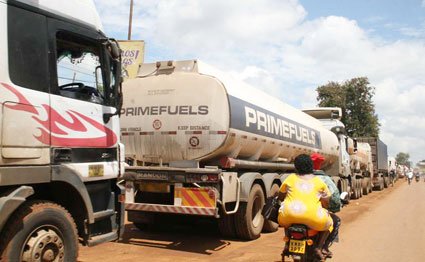Byron Kinene, the chairperson of the Regional Lorry Drivers and Transport Association (RLDTA) says that while truckers were considered high risk groups in the early days of the pandemic, having recorded the highest number of positives, accessing vaccination services has been difficult.
Despite their schedules and the availability of testing services at border points, even truckers who fall under the priority groups like those with underlying illnesses and those aged above 50 years have had to go look for vaccines in designated vaccinating health facilities. Because of this, Kinene says many of them have not yet receive their jabs and continue being a threat to efforts to limit the spread
This is has been revealed just a day after genome sequencing that categorizes the coronavirus strains circulating in the country found Uganda to have five strains of which the UK, South African, and the Nigerian strain were reportedly ferried into the country by truck drivers.
In the aftermath, Health Minister Dr. Jane Ruth Aceng has said that Uganda Virus Research Institute (UVRI) found both the UK and the South African strains to be common among truckers from Kenya.
Although Kenya and Tanzania have been put among countries in category two where non-urgent travel to Uganda should be suspended due to spiraling COVID-19 cases, specific interventions targeting vaccination of truck drivers remain unavailable. Aceng says that they can always get vaccinated at the various vaccination centres when they return from their journeys.
For vaccination, Kinene says the Ministry should have established centres at border points for drivers to get their jabs and continue with their journeys just like it is for testing at land border points. Instead of this, Aceng says, they are strengthening testing such that only accredited laboratories at border points can do the testing after concerns that drivers were presenting fake test certificates for clearance at the border.
She says that Uganda has accredited ten laboratories to work at border points which will be integrated into the regional electronic drivers tracking system so that any other results presented from other labs are rejected at any of the borders in the East African Community (EAC).
She added that ministers of health of different partner states are exploring a regional electronic common health pass that drivers can present at country entry points to give them a clean bill of health. She said the way forward about this will be known next Friday, May 15, when their next meeting sits. URN








